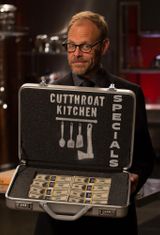
Specials
2013-08-11 | Reality | 39 episodes16 Seasons
Episode
Alton’s After-Show - Man vs. Sabotage - S01E01 (2013)
When judge Antonia Lofaso entered the Cutthroat Kitchen and tasted the chefs’ turkey dinner, French toast and lobster roll dishes, she wasn’t privy to the events that had unfolded and ultimately led to those particular plates of food. Simply critiquing and praising the offerings based solely on taste, she knew not of the thousands of dollars that had been spent to force a competitor to cook with a precooked, processed turkey instead of a fresh bird, to prepare a meal sans utensils, to feature red wine and blue cheese in French toast, and to make bread from scratch in only 30 minutes. On his first-ever Alton’s After-Show, Alton revealed these secrets and others to judge Antonia, who finally realized the making of the meals she had just tasted. “It’s all coming together now,” she told Alton. In perhaps the most telling reveal, she learned that all of these sabotages, seemingly insurmountable given the time constraints and demands of the challenge, had been inflicted on one competitor: Chef Frankie. It was up to him to adapt to these struggles — sometimes multiple ones in a single round — and attempt to turn out passable plates. Read more at: http://blog.foodnetwork.com/fn-dish/2013/08/cutthroat-kitchen-altons-after-show-episode-1/?oc=linkback

Alton’s After-Show - Strategy Reigns Supreme - S01E02 (2013)
To succeed in the Cutthroat Kitchen, it’s not enough for a chef to come equipped with his lucky knife kit and years of experience at the stove. After all, a fellow competitor may prevent his use of that cutlery and make him question the extent of his skills, all with the help of $25,000 in spending money and the will to disrupt. Chefs must take assigned curve balls in stride and turn out quality dishes for a judge, who, without knowledge of the earlier mind games, will decide based on taste alone whose plate is the weakest. On Alton’s After-Show, host Alton Brown will reveal to the judge what’s gone down, and together they’ll dish on how the events unfolded and the food ultimately came to light. In the series premiere, judge Simon Majumdar joined Alton in the Cutthroat Kitchen, and even after learning of some chefs’ use of inferior pork products in Round 1, revealed, “They all produced dishes that were kind of passable with one or two errors, rather than bad dishes with one or two good things about them.” Even though Chef Gianchetti had the most sought-after meat — thick-cut bone-in chops — in that round, his pork was severely overcooked, so much so that Simon admitted that “is actually worse than getting a poor ingredient and making it tasty.” In what may prove true in each episode throughout the series, Simon explained: “Being a great chef is one thing. Being a strategic chef is another. If you can combine those, you can actually end up winning Cutthroat Kitchen without being technically the best chef.” It’s that kind of thinking that would lead chefs to risk wisely and cook intelligently in order to best their rivals and ultimately take home cash. Read more at: http://blog.foodnetwork.com/fn-dish/2013/08/cutthroat-kitchen-altons-after-show-episode-2/?oc=linkback

Alton’s After-Show - A Win For Sale - S01E03 (2013)
On last week’s After-Show, judge Simon Majumdar said: “Being a great chef is one thing. Being a strategic chef is another. If you can combine those, you can actually end up winning Cutthroat Kitchen without being technically the best chef.” And tonight Alton may have proved that theory to be true when he told Simon the lengths to which one competitor went to claim the win. The name of the game in Cutthroat Kitchen is indeed sabotage, but with that comes personal advantages for the competitor dealing those devastating blows to his or her rivals. With every big-ticket disruption one chef purchases and assigns to another contestant, he’s essentially buying himself safety from that challenge. Alton told Simon that, in this week’s final auction, one chef — who would ultimately go on to win the battle — spent almost all of his or her money ensuring his or her own smooth finish by assigning someone else the challenge of making crab cakes without a binder, like mayonnaise. This person “bought victory,” Simon said of the outcome, chalking up this reality to the fact that “anything is possible in Cutthroat Kitchen.” Read more at: http://blog.foodnetwork.com/fn-dish/2013/08/cutthroat-kitchen-altons-after-show-episode-3/?oc=linkback

Alton’s After-Show - Succumbing to Self-Defeat - S01E04 (2013)
When chefs enter Cutthroat Kitchen, they’re likely expecting a bit — or a lot — of sabotage to be dealt upon them by their rivals. After all, it’s this play-or-be-played mentality that makes the competition as fiercely cutthroat at is it. But what they may not expect is that some of their most prominent challenges will likely come not from their dwindling cash supply, another contestant or unexpected ingredient swaps, but rather from themselves and their ideas about how to succeed in Cutthroat Kitchen. On this week’s After-Show, judge Simon Majumdar and host Alton Brown noticed that in almost every round of cooking, chefs faced significant obstacles — some so damaging that they led to eliminations — on account of their own shortcomings. “He wasn’t sabotaged there,” Alton told Simon of Chef Scipione’s absence of bread in his Round 1 cheese steak sandwich. “He just didn’t make it out of the pantry with any bread.” This oversight ultimately cost Chef Scipione his place in the competition, as Simon noted that the chef’s finished dish “wasn’t a Philly cheese steak in any form that I would recognize.” For another competitor, the problem proved to be not mere forgetfulness but an inability to work well under pressure. “I think he got stuck,” Simon said of Chef Zadi in Round 3, in which he was forced to make a pizza using a pie. “I think he just didn’t know where to go to make a really good pizza.” While it’s no surprise that competitors are left with few ideas of how to proceed when faced with last-minute ingredient changes and diminishing time on the clock, Alton explained: “Sometimes the cooking wins and sometimes the game play wins. And today, the game play won.” In the end, he warns, “Confidence can kill, but then not having enough will kill too.” Read more at: http://blog.foodnetwork.com/fn-dish/2013/09/cutthroat-kitchen-altons-after-show-episode-4/?oc=linkback

Alton's After-Show - Planning Under Pressure - S01E05 (2013)
No matter how prepared a chef may be when he walks into Cutthroat Kitchen, or how well-conceived his ideas are for one round’s challenge dish, he can’t say for certain whether he’ll be able to use those skills or his thought-out plan, as a sabotage may ultimately get the better of him. The key to success in this contest is a competitor’s ability to adapt to culinary interferences as he meets them — finding new ways to add flavor to food when salt isn’t an option and learning how to fashion utensils out of foil when traditional devices are prohibited, among them. But what happens when, whether because of strategic game play or simple good fortune, a chef has the opportunity — the time, ingredients and equipment — to make just what he had intended? In the latest installment of Alton’s After-Show, the host and this week’s judge, Antonia Lofaso, dished on the competitors’ seeming need to do more and cook more than they ought to have or needed to simply because they could. Antonia explained that Chef McNutt’s Round-2 tuna burger would have been far more successful had she served it without the bread, which she decided to purchase for $2,200 mid-challenge because she didn’t have any. “I’ve seen this in so many … chefs under the gun,” Antonia explained. “They have a plan and they start to doubt themselves, and all of a sudden, their plan just goes right out the window. And it’s so important for them to just stick with what is good in their gut … and do that first idea.” Similarly, Chef Brian should have realized the need for straightforwardness in his fried chicken dinner, instead of forcing additional components on it just because he had the time do so. “The technique of restraint is what chefs always need to work on,” Antonia noted. “These days, just keep it simple and do it well.” Alton may have said it best when he admitted, “Very often, less is more.” Read more at: http://blog.foodnetwork.com/fn-dish/2013/09/cutthroat-kitchen-altons-after-show-episode-5/?oc=linkback

Cast
View Live Cast Profile
Photo

